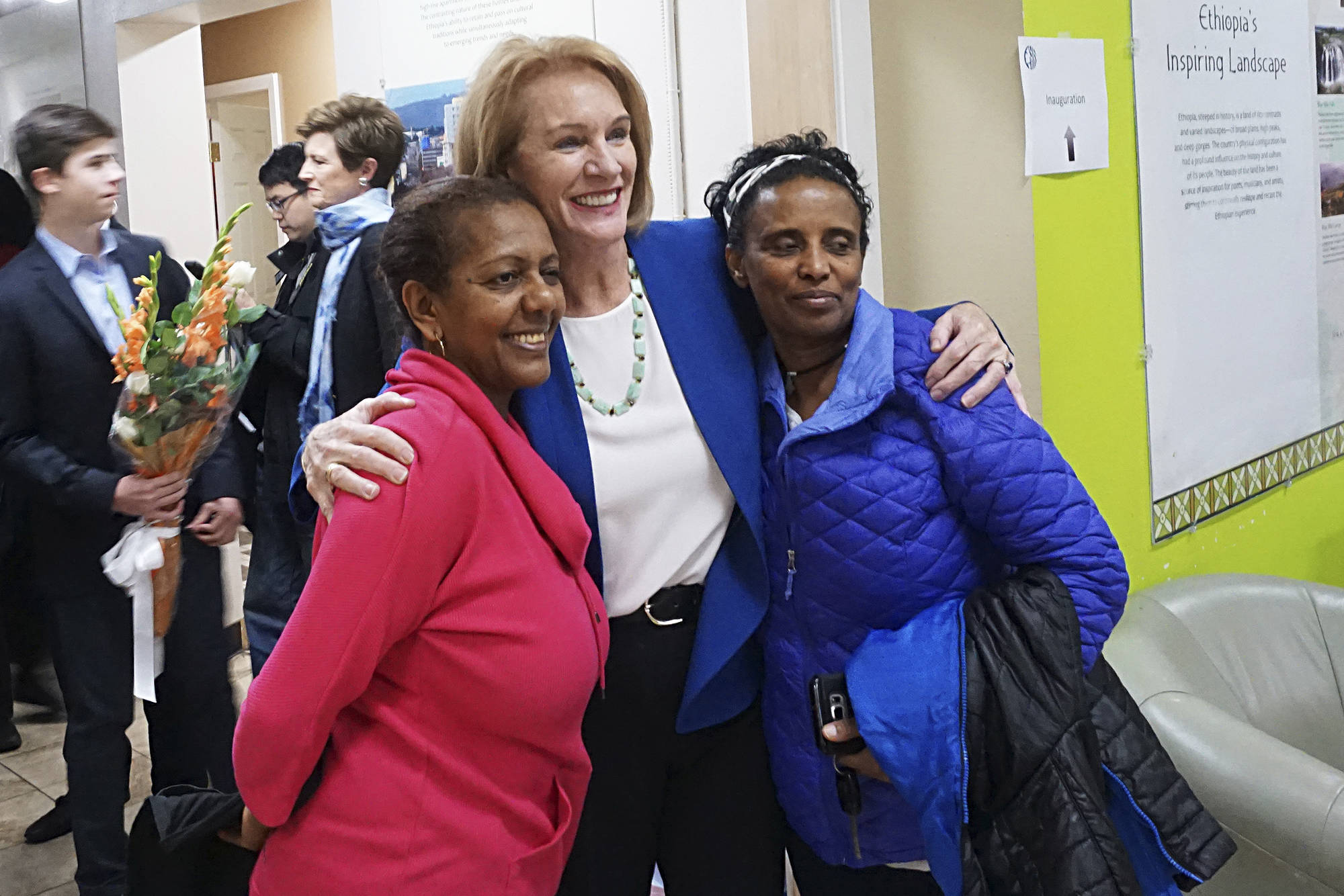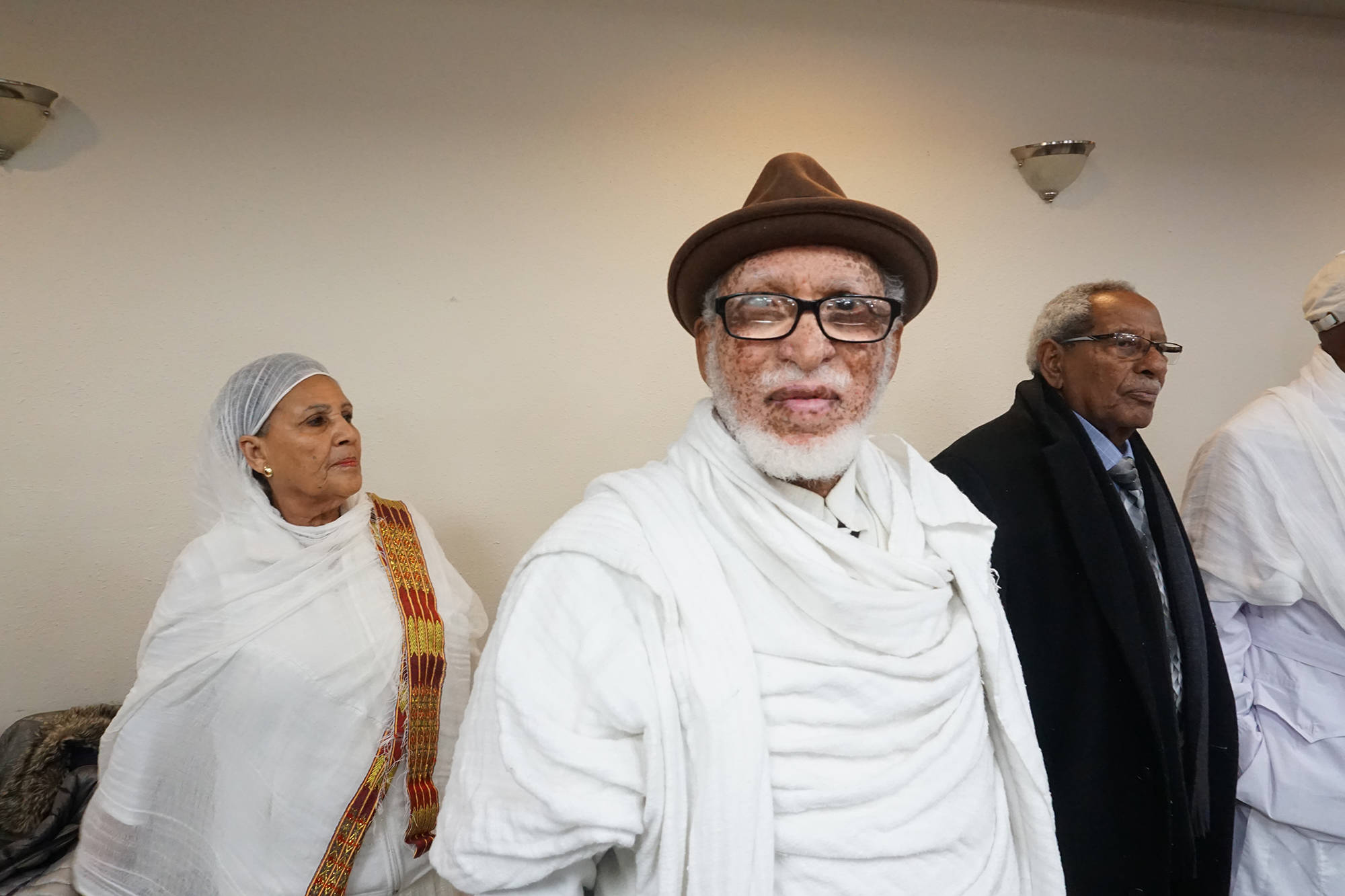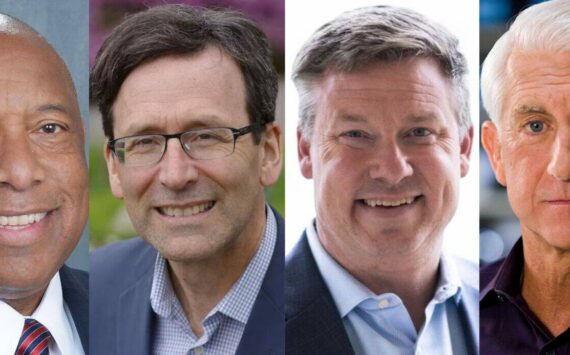When Jenny Durkan arrived at Rainier Beach’s Ethiopian Community in Seattle on Tuesday afternoon, she waded through a sea of reporters and made a beeline for a small café tucked in the hallway. “I told you I’d be back,” Durkan emphatically said as she embraced barista Menbe Tadesse.
Durkan had visited the community center, which is regarded as a linchpin of Seattle’s Ethiopian community, several times throughout her mayoral campaign to drink coffee and listen to community members’ most pressing concerns, like their need for affordable housing and services for seniors.
On Tuesday afternoon, she fulfilled her promise to return during her official swearing-in, which was held at the center. Seattle’s first female mayor in nearly a century and the city’s first openly lesbian leader, Durkan shirked tradition by opting for a five-stop citywide tour beginning in Rainier Beach and ending in Lake City in lieu of delivering a City Hall inauguration speech.
As Durkan approached the stage flanked by the American flag and the green, yellow, and red banner of Ethiopia, the diverse audience erupted into applause, Ethiopian women clad in white cloth releasing a high-pitched tongue trill. U.S. District Court Judge Richard Jones administered her oath, likening Durkan’s election to the history-making one of President Barack Obama. Durkan is the city’s second female mayor following Bertha Knight Landes, who served from 1926 to 1928. “Get ready Seattle,” Judge Jones said, “to see excellence in operation.”
Durkan, who wore a royal blue blazer and black slacks, flashed a toothy smile as she settled at the podium. “We will make sure that we listen to your ideas, to your concerns and to your hopes and dreams,” Durkan said at the beginning of her speech. “I believe we can come together to build a more progressive, inclusive, and united Seattle.”
During her speech, Durkan addressed homelessness, affordable housing and growth that has outpaced services such as transportation. “If there were easy solutions, Seattle probably wouldn’t have elected a woman mayor,” she quipped. Durkan’s oration was peppered with regional humor, like: “Al Gore thinks he invented the Internet,” she paused, “we put it to work.”
She promised to begin signing executive orders this week that addressed affordability, access to higher education, and strengthening the city’s social justice initiatives. “Now let’s get to work,” Durkan concluded her talk amid applause. Before the end of the night, Durkan signed executive orders regarding rental vouchers and the city’s Race and Social Justice Initiative. On Wednesday, she plans on unveiling her proposal for two years of free community college tuition, as she promised during her campaign.
Some of the Ethiopian attendees, like community elder Asefa A. Tessema, were unable to vote for her because they lacked U.S. Citizenship, but said they believed she would improve access to affordable housing and education. Aside from a brown porkpie hat, Tessema was decked head to toe in white. Dangling from his hand was a “chera,” a stick ending in horsehair held as a status symbol.
Tessema is one of several elders advocating for a housing project for seniors and low-income families. Community members have requested money for the housing project for more than a year, although it has yet to receive city funding to get it off the ground, according to the city’s Office of Planning and Community Development. “Maybe this mayor will fulfill our request,” Tessema said.
Durkan took office on November 28 instead of in January, since former Mayor Ed Murray resigned amid sexual abuse allegations. She is the fourth mayor in four months; City Council President Bruce Harrell and Councilmember Tim Burgess temporarily filled in following Murray’s resignation.
She was the frontrunner in a dramatic mayoral race that began with 21 primary candidates. A substantial fundraising haul, as well as endorsements from labor unions, the Seattle Metropolitan Chamber of Commerce, and big businesses helped carry her to success.
While Durkan crisscrossed the city, Councilmember Teresa Mosqueda was sworn in at City Hall. Councilmember Mosqueda also took her seat earlier than usual to replace former Councilmember Tim Burgess, who served as interim mayor this fall.
“I will hold myself accountable to the same standards I’ve held other elected officials—to stay true to protect the most vulnerable, to lead with community ideas and intent, and to always be pushing for progressive change,” Councilmember Mosqueda said during her oath of office speech. “A fresh wave of leaders is rising and resisting and running for office for the first time ever—record numbers of women, members of the LGBTQ community, and people of color. I am one of them. Our place as advocates and organizers is among them,” she added.
After Durkan left the Ethiopian community center to continue her tour, barista Tadesse made coffee and ran back and forth between the café’s yellow and red walls to assist others. Tadesse has a slight build, wears a maroon sweater and her hair pulled into a bun. A gold cross dangles from her neck as she shares that she first met Durkan while she was canvassing about six months ago.
Tadesse, a Seattle resident for more than 15 years who has a green card, was unable to vote for Durkan, yet she believes that Durkan will help improve access to resources for the Ethiopian community.
“Not only my life, she change Seattle I hope,” Tadesse said, adding that she’d like housing to become more affordable under Durkan. “She love community, she love listening [to] people, she love diversity,” Tadesse concluded.









